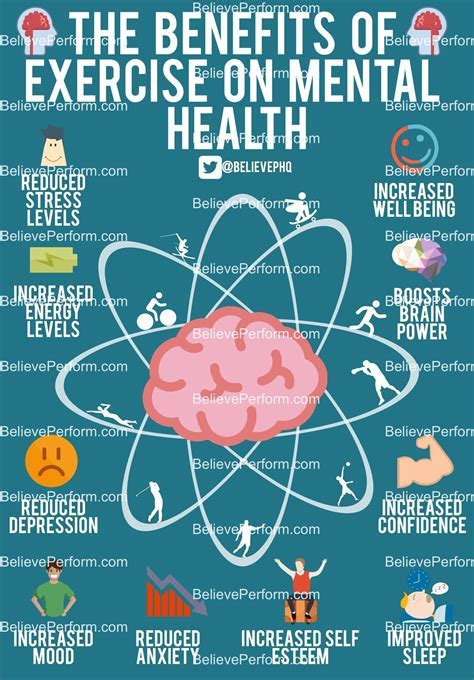Engaging in regular physical activity can have a profoundly positive impact on our overall mental and emotional well-being. In today's fast-paced world, where stressors seem to be lurking around every corner, finding effective ways to take care of our mental health is essential. While many individuals may perceive exercise merely as a means to improve physical fitness, its benefits extend far beyond sculpting a toned physique.
Fostering a Harmonious Mind-Body Connection
Physical activity not only improves our physical strength but also acts as an invigorating tonic for our mental faculties. It nurtures an intimate connection between our mind and body, fostering a harmonious synergy that allows us to feel more in tune with ourselves.
Engaging in activities such as jogging, cycling, or practicing yoga can unleash a cascade of endorphins – often referred to as the "feel-good" hormones – that infuse us with a renewed sense of vitality. These natural mood enhancers stimulate our brain, helping to alleviate symptoms of anxiety, depression, and stress.
Cultivating Resilience and Emotional Stability
Regular physical exercise not only has an immediate impact on our emotional state but also brings about long-lasting changes that contribute to emotional resilience and stability. By making exercise a consistent part of our routine, we can build a solid foundation for mental well-being.
Physical activities challenge us to push past our limits, both physically and mentally. As we overcome obstacles and meet new personal goals, we develop a sense of accomplishment and self-efficacy. These experiences translate into increased self-confidence and a greater ability to cope with life's challenges.
Boosting Cognitive Function and Emotional Clarity
Regular exercise has been associated with enhanced cognitive function, increased focus, and improved memory retention. The benefits of physical activity extend beyond the physical realm, empowering our mental faculties as well.
Engaging in activities that elevate our heart rate promotes blood flow to the brain, delivering vital nutrients and oxygen that enhance cognitive processes. This boost in brain function leads to improved problem-solving skills, enhanced creativity, and heightened emotional clarity.
The Connection Between Consistent Physical Activity and Enhanced Mental Well-being

In this section, we will explore the profound relationship between regular physical activity and improved emotional and cognitive health. Engaging in a consistent exercise routine offers individuals a variety of psychological advantages, positively impacting their overall well-being. Through promoting the harmonious interaction between the mind and body, regular physical activity fosters a sense of emotional balance and cognitive clarity. By examining the intricate connection between physical exertion and its influence on mental wellness, we can gain a deeper understanding of the profound impact exercise can have on our mental well-being.
Emotional Stability Consistent physical activity serves as a powerful tool in promoting emotional stability, alleviating symptoms of stress, anxiety, and depression. Regular exercise stimulates the release of endorphins, often referred to as "feel-good" hormones, which induce feelings of happiness and relaxation. By engaging in activities like cardio exercises, yoga, or dancing, individuals can reduce negative emotional states, enhance their mood, and achieve a greater sense of emotional well-being. | Enhanced Cognitive Function Regular physical activity has a remarkable impact on cognitive function, playing a vital role in improving memory, focus, and overall mental performance. Through increased blood flow and oxygenation, exercise helps nourish brain cells, promoting neuroplasticity and facilitating the growth of new neural connections. This enhanced neural activity not only boosts cognitive abilities but also aids in reducing the risk of cognitive decline and age-related neurodegenerative diseases. |
Stress Reduction and Resilience Engaging in regular exercise offers a powerful outlet for stress reduction and the cultivation of resilience. Physical activity helps reduce the production of stress hormones such as cortisol, while simultaneously increasing the production of endorphins. This hormonal balance contributes to a heightened sense of emotional well-being and resilience, equipping individuals with the ability to better manage stress and navigate the challenges of daily life. | Improved Sleep Quality Consistent physical activity has been linked to improved sleep quality and duration. Regular exercise helps regulate the body's circadian rhythm, promoting a healthy sleep-wake cycle. Additionally, physical exertion contributes to the release of tension in the body, thus reducing the likelihood of insomnia and improving overall sleep quality. By incorporating exercise into their routine, individuals can enjoy more restful nights and wake up feeling refreshed and energized. |
In conclusion, the connection between consistent physical activity and improved mental well-being is evident. By actively engaging in regular exercise, individuals can experience emotional stability, enhanced cognitive function, reduced stress levels, and improved sleep quality. These advantages ultimately contribute to an overall elevated state of mental well-being, positively impacting all aspects of life. Therefore, incorporating physical activity into one's lifestyle is not only beneficial for physical health but also a fundamental pillar of mental well-being.
Enhancing Mood and Alleviating Stress
Maintaining a regular physical activity routine can have a significant impact on enhancing one's emotional well-being and reducing feelings of stress. Engaging in exercise not only boosts mood, but also acts as a powerful stress-reliever.
When we participate in physical activity, our body releases endorphins, which are known as the "feel-good" hormones. These endorphins interact with receptors in the brain, resulting in an improved mood and a sense of happiness. Additionally, exercise stimulates the production of neurotransmitters such as dopamine and serotonin, which play crucial roles in regulating our mood and reducing symptoms of depression and anxiety.
Incorporating regular exercise into our daily routine helps to alleviate stress levels. Physical activity provides an outlet to release built-up tension and pent-up emotions, allowing us to effectively manage stress. Moreover, exercise promotes better sleep, which further contributes to mental relaxation and overall well-being.
An essential aspect of boosting mood and reducing stress through exercise is finding activities that we find enjoyable and engaging. Whether it's going for a run outdoors, practicing yoga, or participating in team sports, finding an exercise routine that brings pleasure can significantly enhance the mental health benefits of physical activity.
| Benefits of physical activity for mood and stress reduction: |
|---|
|
Enhancing Cognitive Function and Mental Clarity

In addition to promoting mental well-being, regular physical activity can have a profound impact on cognitive function and mental clarity. Engaging in consistent exercise routines can enhance various aspects of cognition, including memory, attention, and problem-solving skills.
Physical activity stimulates the release of neurotransmitters in the brain, such as dopamine and serotonin, which are essential for optimal brain function. These neurotransmitters regulate mood, motivation, and cognitive abilities, leading to enhanced mental clarity and focus.
| Improved Memory | Enhanced Attention | Sharper Problem-Solving Skills |
|---|---|---|
| Regular exercise has been shown to improve both short-term and long-term memory functions. It aids in the formation and consolidation of memories, making it easier to recall information and retain it over time. | Engaging in physical activity increases blood flow to the brain, delivering oxygen and nutrients necessary for optimal cognitive performance. This improved blood flow can enhance attention and concentration, allowing individuals to stay focused on tasks for more extended periods. | Exercise promotes the growth of new brain cells and strengthens neural connections, which can improve problem-solving skills. It boosts cognitive flexibility, enabling individuals to think outside the box and find innovative solutions to challenges. |
Incorporating regular physical activity into one's lifestyle can also have a positive impact on overall mental well-being. It reduces stress and anxiety levels, improves mood and self-esteem, and fosters a sense of accomplishment, all of which contribute to enhanced cognitive function and mental clarity.
Enhancing Mental Resilience through Consistent Physical Activity
Developing mental resilience is crucial for maintaining well-being in the face of life's challenges. Regular engagement in physical activity offers a promising avenue for strengthening mental resilience, allowing individuals to better adapt and cope with stressors and setbacks. By embracing a consistent exercise routine, individuals can cultivate a resilient mindset and foster improved mental health.
| Improved Coping Mechanisms | Elevated Emotional Well-being | Enhanced Cognitive Function |
|---|---|---|
Physical activity provides an opportunity to develop and refine effective coping mechanisms, enabling individuals to handle stress, adversity, and setbacks more effectively. Through regular exercise, individuals can build emotional resilience and develop healthier ways of managing difficulties, contributing to overall mental well-being. | Engaging in consistent physical activity promotes the release of endorphins and neurotransmitters, such as serotonin, which are known to improve mood. This natural mood enhancement can help combat symptoms of anxiety and depression, fostering elevated emotional well-being and a stronger ability to withstand mental challenges. | Regular exercise has been linked to enhanced cognitive function, including improved memory, focus, and attention span. These cognitive benefits can be attributed to increased blood flow to the brain and the release of growth factors, which contribute to the growth and maintenance of nerve cells. By enhancing cognitive function, physical activity supports mental agility and resilience. |
Fostering mental resilience through regular exercise not only equips individuals with the ability to bounce back from adversity but also enhances overall mental well-being. By developing effective coping mechanisms, elevating emotional well-being, and improving cognitive function, consistent physical activity can play a vital role in nurturing mental resilience and promoting a healthier mindset.
FAQ
How does regular exercise affect mental health?
Regular exercise has numerous benefits for mental health. It can help reduce symptoms of depression and anxiety, improve mood and self-esteem, and promote better sleep. Exercise stimulates the release of endorphins, which are natural mood lifters, and it also increases the production of neurotransmitters like serotonin and dopamine, which are linked to improved mental well-being.
Is there a specific type of exercise that is better for mental health?
Any form of exercise that gets your heart rate up and engages your muscles can be beneficial for mental health. This can include activities like walking, jogging, cycling, swimming, dancing, or even doing household chores or gardening. The key is to find something you enjoy and can stick with consistently, as regularity is more important than the specific type of exercise.
How long and how often should I exercise to experience mental health benefits?
The recommended amount of exercise for mental health benefits is at least 150 minutes of moderate-intensity aerobic activity or 75 minutes of vigorous-intensity aerobic activity per week. This can be spread out over several days, such as 30 minutes of exercise on five days of the week. However, even shorter bouts of exercise can have positive effects on mental health, so any amount of physical activity is better than none.
Can exercise help with stress management?
Yes, exercise is an excellent tool for managing stress. When you engage in physical activity, your body releases endorphins, which act as natural stress relievers and help improve your mood. Exercise also helps to reduce levels of cortisol, the stress hormone, in the body. Additionally, engaging in exercise can provide a healthy distraction from stressors and give you a sense of control and accomplishment.
Can exercise improve cognitive function and focus?
Yes, regular exercise has been shown to improve cognitive function and enhance focus. Exercise increases blood flow to the brain, which can enhance memory, attention, and executive function. It also promotes the growth and development of new neurons, which can improve overall brain health. Exercise has been particularly beneficial for older adults, as it can prevent cognitive decline and reduce the risk of developing conditions like Alzheimer's disease.



